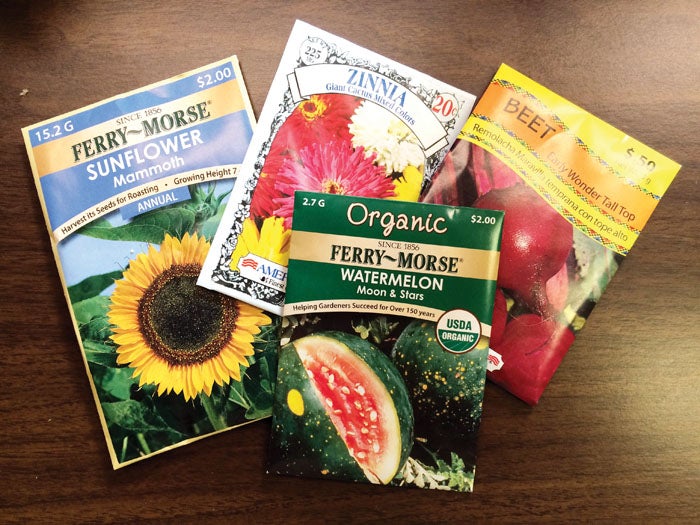Amy-Lynn Albertson: The art of saving seeds
Published 12:00 am Saturday, March 25, 2023

- Saving Seeds can save you money and be fun. Come to the seed saving seminar at the East Rowan Library April 1, at 10 a.m. Register at bit.ly/EastPlants
By Amy-Lynn Albertson
N.C. Cooperative Extension
Saving seeds from your garden for sharing with your friends is sometimes considered a lost art. It takes time, effort and patience, something we are all short on sometimes. Only save seeds from open-pollinated and heirloom varieties to guarantee that your seeds will produce the same plant variety the following growing season. While all heirloom seeds come from open-pollinated varieties, not all open-pollinated plants are heirloom plants. Open-pollinated seeds come from plants fertilized by natural methods like pollinator insects, birds, rain and wind. When two plants of the same variety are cross-pollinated by one of these methods, the resultant seed grows into a plant similar to the parent plants, with only slight variations. These variations lead to genetic diversity, which allows the seeds to gradually adapt to the local climate. Heirloom seed varieties originate from open-pollinated plants and have a history of passing down desired traits from parent plant to child plant. These valuable characteristics are developed through years of cultivation. They may include hardiness, flavor, productivity, pest and disease resistance and climate adaptability. The seeds must originate from plant varieties at least 50 years old to be considered an heirloom variety. Heirloom seeds will always produce offspring true to their parent plant, so you can save your seeds from growing year to year. You can purchase heirloom seeds at your local garden center or nursery or find heirloom seeds that fit your specific region through local seed exchange groups.
Hybrid seeds grow plants that are a mix of two different plant varieties. Plant breeders produce hybrid seeds by cross-pollinating two plant varieties to create a hybrid with positive traits from each variety — a process known as hybrid vigor. Saving hybrid seeds is not ideal since many offspring of hybrid varieties will not resemble the parent plant.
To save seeds is to participate in the process of natural selection. Suppose you save seeds only from the most giant tomato of the bunch and replant them year after year. In that case, you’ll eventually have seeds that produce plants on which all the tomatoes are giant. The same holds true for almost any other trait. Want tomatoes that ripen earlier? Save seed from the first fruits to ripen each year. Want disease-resistant plants? Then definitely don’t save seed from those that are disease-infested. This is basically what professional plant breeders do. Only save seed from your healthiest, most robust, tastiest plants.
For crops that produce watery fruits, the seeds are not always mature when the fruits are ready to eat. Eggplant, cucumber and summer squash fruit are eaten when the fruits are immature and still edible but before the seeds mature. This means that seed savers need to leave a few fruits to fully mature in the garden when they want to save seeds. Dry fruited crops, like grains, lettuce and beans, can be removed from the plant once seeds are dry and hard.
Seed saving can be a stinky job. A seed that develops in a wet, fleshy fruit (tomatoes, melons and cucumbers, for example), as opposed to a dry seedhead or pod (the case with most greens, herbs and legumes), often requires extra steps to get out. The best way to remove the goo is to put it in a jar or bucket with a bit of water and let the concoction rot for a bit. The fermentation process dissolves the goo and improves the germination rate of the seed. You then strain the seeds from the stinky liquid and dry them.
Dried seeds should be placed in paper envelopes or seed packets labeled with the name of the variety and the date it was harvested. Keep the seed packets in mason jars or other container in a cool dark place to ensure longevity. Any seed stored this way should remain viable for at least a few years, though some crops may keep for a decade or more. Collecting and growing seeds is a very gratifying activity. It can save a gardener money on purchasing seeds and gives them more options on plants to put in the garden. However, patience is definitely needed.
To learn more about seed saving or have fun with a plant and seed swap, come to the East Rowan Library Branch at 10 a.m. Saturday, April 1, for a Community Plant Swap. Register at bit.ly/EastPlants or call Sydney at the 704-216-7841. For more information about seed saving or other horticultural topics, contact the Rowan County Extension Center at 704-216-8970.
Amy-Lynn Albertson is director of the Rowan County Extension.




